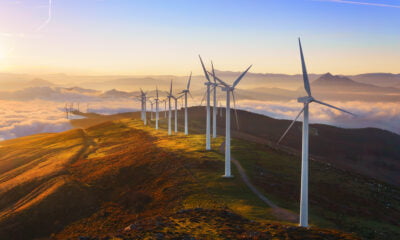

Economy
Scottish independence paper: ‘we need to build renewable wealth’
The Scottish National Party (SNP) has spoken out about some of the challenges Scotland will face if it becomes independent from the UK, including cutting its reliance on carbon.
Speaking at the launch of the party’s white paper, SNP leader and Scottish first minister Alex Salmond said, “With independence we could have the powers and responsibilities we need to seize opportunities, to build a wealthier and fairer nation but also to face our major challenges.”
Debt, inequality and low growth were highlighted as challenges. In order to overcome these, Salmond said Scotland “requires the ability and powers to mobilise and invest in our natural and human resources. We have huge hydrocarbon resources for the next half a century but we need to build renewable wealth which will last forever.”
The white paper aims to provide answers to questions that voters may have about Scotland’s independence. Several questions relate to Scotland’s production of oil and gas. The report stated that whilst Scotland needs a “mixed energy portfolio, including hydrocarbons”, it has a target of delivering the equivalent of 100% electricity demand and 11% of non-electrical heat demand from renewables by 2020.
The report asserted that Scotland’s targets for decarbonisation would remain in place should the country become independent. The SNP argues that independence would give Scotland the “full range of power to develop renewable energy”.
Voters also raised concerns about Scotland’s pursuit of alternative fuel sources and supply, such as the controversial method of fracking. The paper said that these decisions on alternative fuel sources, or the appropriate energy mix, would be for the future Scottish governments to decide.
The SNP has previously spoken out about the “important” role of clean energy. At the party’s conference last month, SNP energy minister Fergus Ewing praised the country’s renewable industry pointing out that it provided jobs, low energy prices and benefitted the community.
The Scottish government has also given a green light to the world’s largest tidal power project, capable of powering the equivalent of 42,000 homes. Meanwhile, research suggests that tidal power could contribute a large amount of the country’s electricity.
On September 18 2014, the Scottish people vote on whether or not they want independence from Westminster. Salmond said the white paper “puts beyond doubt that an independent Scotland would start from a position of strength”.
Further reading:
One year until Scottish independence vote: sustainability news round-up
Half of Scotland could be powered by the tides, say researchers
‘Important’ role of clean energy played up at SNP conference
‘World’s largest tidal power project’ given green light in Scotland
Scottish renewable target ‘realistic’ with adequate private investment


 Environment12 months ago
Environment12 months agoAre Polymer Banknotes: an Eco-Friendly Trend or a Groundswell?

 Features11 months ago
Features11 months agoEco-Friendly Cryptocurrencies: Sustainable Investment Choices

 Features12 months ago
Features12 months agoEco-Friendly Crypto Traders Must Find the Right Exchange

 Energy11 months ago
Energy11 months agoThe Growing Role of Solar Panels in Ireland’s Energy Future





























